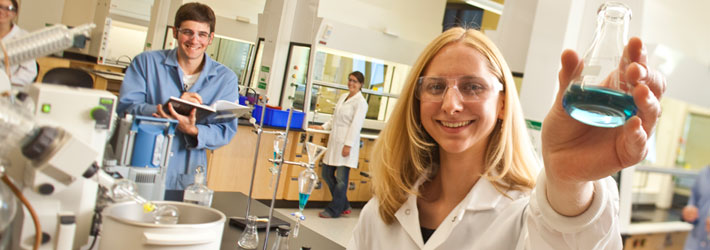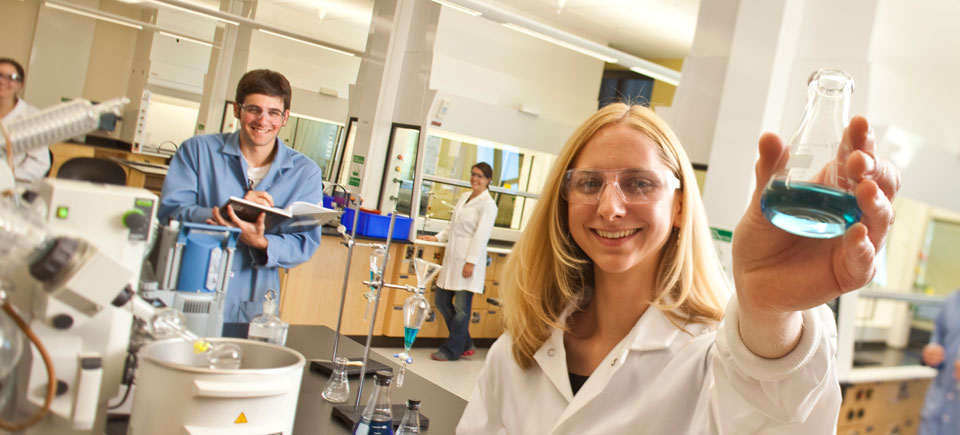
During her sophomore year, Anna Koster discovered her enthusiasm for organic chemistry. But as much as she loved learning the subject in the classroom of one of the University of Nevada's finest chemistry professors, Robert Sheridan, she was also intrigued by the possibility of learning more in a research lab.
"I was getting input from a lot of different professors to get into a research lab and see if I liked it," Koster said. "So that's how I got into undergraduate research. I enjoyed the lecture environment, but research is something completely different. You really do have a tendency to run into unexpected problems in a research lab ... it's exciting when you experience both the successes and the failures that come along with research."
Koster, a 2008 graduate of Galena High School in Reno, has spent nearly five years as a student in the University of Nevada, Reno's College of Science and College of Liberal Arts.
Her academic record is dotted with far too many successes to list here. She will graduate in May with dual degrees in Chemistry and Music. Her minor is Biochemistry.
Over the past year, Anna has received prestigious and intensely competitive national undergraduate academic and research scholarships, including the Barry M. Goldwater Scholarship and the American Chemical Society Division of Organic Chemistry Summer Undergraduate Research Fellowship (SURF) to help fund her organic chemistry research. Koster was the only student from the University of Nevada, and one of only two students in the state, to receive the 2012 Goldwater Scholarship. The SURF fellowship was awarded to twelve students nationwide. It provided funding for Koster's study of novel routes to pharmaceutical precursors, research that she is conducting in the laboratory of Christopher Jeffrey, assistant professor of chemistry. In addition, the fellowship provided funding to present her summer research discoveries at a research symposium hosted by Pfizer in Groton, Connecticut.
And yet, even with her obvious attraction to research, Koster says her experience at the University has taught her the well-rounded value of embracing all subjects, taught by a cadre of professors that she holds in the highest of esteem.
Listen, for example, as she explained how a dual major actually has provided the best possible balance to her life.
"Well, I do have to work all the time and I'm always challenged to get everything done," she said of her busy schedule, which includes piano lessons, classwork, and time spent in the research lab. Then she added, with a thoughtful smile, "On the other hand, if I only did chemistry and didn't have music, I feel things would be out of balance. (Practicing piano, although it is work in and of itself) provides balance."
Koster has played piano since she was nine years old. She has always had an interest in both science and the arts, but wasn't sure what her major would be when she came to the campus in fall 2008.
A series of fortunate and enjoyable experiences, in a series of chemistry classes, sealed the fact that in addition to music, she would major in chemistry.
Her second semester general chemistry professor, Ana de Bettencourt-Dias, was one of Koster's first mentors in the department, introducing her to the career opportunities available in the field of chemistry and providing encouragement to pursue a chemistry major.
Robert Sheridan, with his vast expanse of organic chemistry knowledge and ability to make the subject, in Koster's words, "surprisingly fun" was the professor who "solidified my decision to major in chemistry."
Sarah Cummings, always a supportive force in the department, had a way of "explaining things in a very clear and concise way that I always found helpful."
Once Koster visited Chris Jeffrey's lab, the world of research and the vast potential for solving problems and creating new knowledge, came alive. "You learn what doesn't work a lot of the time," she said. "But when you figure something out, and something works for the first time, and you've discovered something new, it's very exciting."
Joe Cline, now a vice provost at the University, but always known as a knowledgeable and accessible advisor to dozens of chemistry students, was yet another positive influence within the department.
From the music department, Koster's mentor and teacher in piano has been the talented James Winn, who, according to Koster, "has been an inspiration and role model. That's been one of my favorite experiences at the University, taking lessons from Dr. Winn."
Taking all of these professors - and many more like them - together, it is not surprising that Koster hopes to one day become a college professor herself.
"I would hope to inspire and mentor other young scientists just because I've had so many good experiences with my professors at this university," said Koster, who has also tutored a variety of subjects and privately taught beginning and intermediate piano students during her time at Nevada. "I love teaching. I love to write. In general, I can communicate ideas pretty well to people. The appeal of an academic career is that you have the teaching aspect, in addition to the research aspect."
Koster is in the process of applying to all the top chemistry graduate schools, from Caltech to Stanford to Berkeley to Princeton.
Wherever she lands, the odds are good that she will, at the minimum, keep busy, always intrigued by the possibility of doing a little more.
"Considering the amount of time you have to put in when you're in graduate school, I probably won't play piano as much," she said. But then she added, with an optimistic laugh, "Maybe I should ask them, 'Can we have a piano in the lab ... for practice?'"












